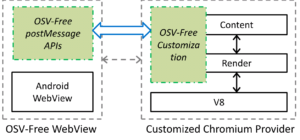INTRODUCTION
postMessage is popular in HTML5 based web apps to allow the communication between different origins. With the increasing popularity of the embedded browser (i.e., WebView) in mobile apps (i.e., hybrid apps), postMessage has found utility in these apps. However, different from web apps, hybrid apps have a unique requirement that their native code (e.g., Java for Android) also needs to exchange messages with web code loaded in WebView. To bridge the gap, developers typically extend postMessage by treating the native context as a new frame, and allowing the communication between the new frame and the web frames. We term such extended postMessage ‘hybrid postMessage’.
However, we find that hybrid postMessage introduces new critical security flaws: all origin information of a message is not respected or even lost during the message delivery in hybrid postMessage. If adversaries inject malicious code into WebView, the malicious code may leverage the flaws to passively monitor messages that may contain sensitive information, or actively send messages to arbitrary message receivers and access their internal functionalities and data. We term the novel security issue caused by hybrid postMessage ‘Origin Stripping Vulnerability’ (OSV).
To mitigate OSV from the root, we design and implement three new postMessage APIs, called OSV-Free. Our evaluation shows that OSV-Free is secure and fast, and it is generic and resilient to the notorious Android fragmentation problem.

SOURCE CODE
OSV-Free’s source code is released in github. Please check it.
PUBLICATION
Study and Mitigation of Origin Stripping Vulnerabilities in Hybrid-postMessage Enabled Mobile Applications
Guangliang Yang, Jeff Huang, Guofei Gu, Abner Mendoza.
In Proc. of the 39th IEEE Symposium on Security and Privacy (S&P’18), San Francisco, CA, May 2018. [pdf] [bib]
